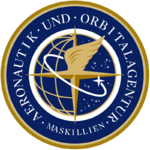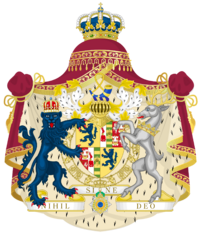MAOA: Difference between revisions
No edit summary |
No edit summary |
||
| Line 26: | Line 26: | ||
The '''Mascyllary Aeronautical and Orbital Agency''' ({{wp|German language|Hesurian}}: ''Maskillische Aeronautik- und Orbitalagentur''), more commonly known as '''MAOA''', is a {{wp|government agency}} of the [[Mascylla|Crowned Republic of Mascylla]] primarly tasked with and engaged in operations of its civil {{wp|space program}}, {{wp|space exploration}}, {{wp|space science}}, and {{wp|aerospace}} and {{wp|aeronautics}} research. The {{wp|space agency}} is subordinate to the Ministry of Education of the Realm of the [[Government of Mascylla|Mascyllary government]], and is headed by an appointed Chief Director as administrator nominated by the [[Prime Minister of Mascylla|Prime Minister]]; the current Chief Director is former astronaut veteran Hannah Gutenfeld (as of 2022). | The '''Mascyllary Aeronautical and Orbital Agency''' ({{wp|German language|Hesurian}}: ''Maskillische Aeronautik- und Orbitalagentur''), more commonly known as '''MAOA''', is a {{wp|government agency}} of the [[Mascylla|Crowned Republic of Mascylla]] primarly tasked with and engaged in operations of its civil {{wp|space program}}, {{wp|space exploration}}, {{wp|space science}}, and {{wp|aerospace}} and {{wp|aeronautics}} research. The {{wp|space agency}} is subordinate to the Ministry of Education of the Realm of the [[Government of Mascylla|Mascyllary government]], and is headed by an appointed Chief Director as administrator nominated by the [[Prime Minister of Mascylla|Prime Minister]]; the current Chief Director is former astronaut veteran Hannah Gutenfeld (as of 2022). | ||
Established in 1970 in the wake of the [[Great Game (Aurorum)|Great Game's]] [[Space Race (Aurorum)]], MAOA was initially tasked with overseeing the civil development of Mascylla's space program, alongside the space activities of the [[Mascyllary Air Force|Air Force]]. In the 1970s, MAOA led most of the space exploration efforts of the country, including launching the first Mascyllary {{wp|satellite}}, ''Polaris'', in 1971, the second {{wp|human spaceflight|human into orbit}}, [[Lukas Brennzer]], in 1974, and the missions of the {{wp|Project Gemini|''Pionier'' program}} from 1976 to 1978. ''Polaris'' and Brennzer made Mascylla the second country to achieve the capability of orbital launches and the second country to send humans into space, respectively. The [[Sigma program]] was a collaborative effort between MAOA and the [[Dulebian space program|space program]] of the [[People's Republic of Dulebia|PRD]] beginning in 1978, that culminated in the first crewed {{wp|Moon landing|lunar landing}} with [[Sigma 5]] in 1980; the {{wp|Saturn V|Atlant-3}} {{wp|super heavy-lift launch vehicle}}, Sigma {{wp|Command Service Module}} (CSM), {{wp|Lunar Module}} (LM), and Lunar Surface Access Module (LSAM) were all developed either fully or in part by MAOA. Later efforts were mainly concentrated on the establishment and operation of [[Haller Base]] as a {{wp|research station}} on Luna from 1987 to 2009, as well as the semi-{{wp|reusable launch system|reusable}} {{wp|Space Shuttle|''Raumfähre''}} in {{wp|low Earth orbit|low Aurorum orbit}}. Additionally, since 199X, MAOA is a major partner of the X and in development of X. | Established in 1970 in the wake of the [[Great Game (Aurorum)|Great Game's]] [[Space Race (Aurorum)|Space Race]], MAOA was initially tasked with overseeing the civil development of Mascylla's space program, alongside the space activities of the [[Mascyllary Air Force|Air Force]]. In the 1970s, MAOA led most of the space exploration efforts of the country, including launching the first Mascyllary {{wp|satellite}}, ''Polaris'', in 1971, the second {{wp|human spaceflight|human into orbit}}, [[Lukas Brennzer]], in 1974, and the missions of the {{wp|Project Gemini|''Pionier'' program}} from 1976 to 1978. ''Polaris'' and Brennzer made Mascylla the second country to achieve the capability of orbital launches and the second country to send humans into space, respectively. The [[Sigma program]] was a collaborative effort between MAOA and the [[Dulebian space program|space program]] of the [[People's Republic of Dulebia|PRD]] beginning in 1978, that culminated in the first crewed {{wp|Moon landing|lunar landing}} with [[Sigma 5]] in 1980; the {{wp|Saturn V|Atlant-3}} {{wp|super heavy-lift launch vehicle}}, Sigma {{wp|Command Service Module}} (CSM), {{wp|Lunar Module}} (LM), and Lunar Surface Access Module (LSAM) were all developed either fully or in part by MAOA. Later efforts were mainly concentrated on the establishment and operation of [[Haller Base]] as a {{wp|research station}} on Luna from 1987 to 2009, as well as the semi-{{wp|reusable launch system|reusable}} {{wp|Space Shuttle|''Raumfähre''}} in {{wp|low Earth orbit|low Aurorum orbit}}. Additionally, since 199X, MAOA is a major partner of the X and in development of X. | ||
MAOA has deployed satellites to conduct research on {{wp|Earth science|Aurorum science}}, {{wp|heliophysics}}, and {{wp|astrophysics}} through {{wp|space telescope|space telescopes}}, and operated {{wp|robotic spacecraft}} such as ''Bote'', ''Gobelt'' and ''VESPAGO'' throughout the Iliosar System for planetary and other astrophysical studies. Cape Weimud Space Center (CWSC) on [[Akawhk]] is the primary {{wp|spaceport}} for crewed and uncrewed space missions, and the Old State Chancellery (''Alte Landeskanzlei'') in [[Königsreh]] is the MAOA administrative {{wp|headquarters}} since 1979; its {{wp|mission control center}} (MCC) is located in Dockfurt. | MAOA has deployed satellites to conduct research on {{wp|Earth science|Aurorum science}}, {{wp|heliophysics}}, and {{wp|astrophysics}} through {{wp|space telescope|space telescopes}}, and operated {{wp|robotic spacecraft}} such as ''Bote'', ''Gobelt'' and ''VESPAGO'' throughout the Iliosar System for planetary and other astrophysical studies. Cape Weimud Space Center (CWSC) on [[Akawhk]] is the primary {{wp|spaceport}} for crewed and uncrewed space missions, and the Old State Chancellery (''Alte Landeskanzlei'') in [[Königsreh]] is the MAOA administrative {{wp|headquarters}} since 1979; its {{wp|mission control center}} (MCC) is located in Dockfurt. | ||
Latest revision as of 09:13, 21 June 2022
This article is incomplete because it is pending further input from participants, or it is a work-in-progress by one author. Please comment on this article's talk page to share your input, comments and questions. Note: To contribute to this article, you may need to seek help from the author(s) of this page. |
Maskillische Aeronautik- und Orbitalagentur | |
 MAOA emblem | |
 MAOA logo | |
| Abbreviation | MAOA |
|---|---|
| Motto | Suos Cultores Scientia Coronat ("Knowledge Crowns Those Who Seek Her") |
| Formation | 11 August 1970; 52 years ago |
| Headquarters | Königsreh, Mascylla |
Administrator | Hannah Gutenfeld |
| Cape Weimud Space Center, Akawhk | |
Parent organisation | |
Budget | |
Staff | 14,992 (2019) |
The Mascyllary Aeronautical and Orbital Agency (Hesurian: Maskillische Aeronautik- und Orbitalagentur), more commonly known as MAOA, is a government agency of the Crowned Republic of Mascylla primarly tasked with and engaged in operations of its civil space program, space exploration, space science, and aerospace and aeronautics research. The space agency is subordinate to the Ministry of Education of the Realm of the Mascyllary government, and is headed by an appointed Chief Director as administrator nominated by the Prime Minister; the current Chief Director is former astronaut veteran Hannah Gutenfeld (as of 2022).
Established in 1970 in the wake of the Great Game's Space Race, MAOA was initially tasked with overseeing the civil development of Mascylla's space program, alongside the space activities of the Air Force. In the 1970s, MAOA led most of the space exploration efforts of the country, including launching the first Mascyllary satellite, Polaris, in 1971, the second human into orbit, Lukas Brennzer, in 1974, and the missions of the Pionier program from 1976 to 1978. Polaris and Brennzer made Mascylla the second country to achieve the capability of orbital launches and the second country to send humans into space, respectively. The Sigma program was a collaborative effort between MAOA and the space program of the PRD beginning in 1978, that culminated in the first crewed lunar landing with Sigma 5 in 1980; the Atlant-3 super heavy-lift launch vehicle, Sigma Command Service Module (CSM), Lunar Module (LM), and Lunar Surface Access Module (LSAM) were all developed either fully or in part by MAOA. Later efforts were mainly concentrated on the establishment and operation of Haller Base as a research station on Luna from 1987 to 2009, as well as the semi-reusable Raumfähre in low Aurorum orbit. Additionally, since 199X, MAOA is a major partner of the X and in development of X.
MAOA has deployed satellites to conduct research on Aurorum science, heliophysics, and astrophysics through space telescopes, and operated robotic spacecraft such as Bote, Gobelt and VESPAGO throughout the Iliosar System for planetary and other astrophysical studies. Cape Weimud Space Center (CWSC) on Akawhk is the primary spaceport for crewed and uncrewed space missions, and the Old State Chancellery (Alte Landeskanzlei) in Königsreh is the MAOA administrative headquarters since 1979; its mission control center (MCC) is located in Dockfurt.

